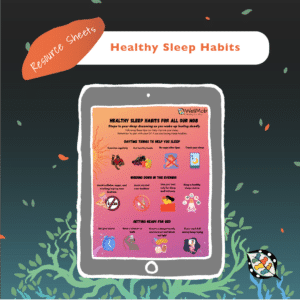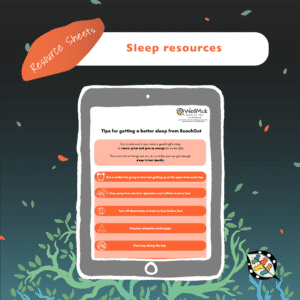Did you know that quality sleep is like mental health’s superpower! Sleep can help us manage emotions better, stress less and have more patience. With good quality sleep we better deal with the day-to-day challenges thrown our way.
If we are feeling worried or anxious, this can disrupt sleep. A lack of sleep can affect our mental health.
It’s important to have healthy habits for the best chance of getting enough sleep. If feeling low or stressed, getting to sleep and staying asleep isn’t always easy. Our minds can race, our bodies can be restless, and we can end up lying in bed tossing and turning, trying to get to sleep.
Research tells us that eating well, being active and getting a good night’s sleep is important for good mental health. Our bodies and brains need sleep to grow and repair, rest and rejuvenate.
Thankfully, there is evidence to support a good sleep routine. These tips will not only help you get to sleep more easily, but also improve the quality of your sleep.
Daytime things to help you sleep
Exercise regularly: A daily walk or stretch can improve sleep quality. Try and do something outdoors, although avoid intense workouts at night that may disrupt sleep.
Eat healthy foods: Avoid sugary foods and drinks, especially near bedtime. A light bedtime snack can help sleep although avoid large late-night meals.
No naps after 3pm: If you must nap, keep it less than an hour and only before 3pm.
Track your sleep: Try recording your sleep patterns to see what may help or hinder your sleep in an app or diary.
Winding down in the evening
Avoid caffeine, sugar, and smoking/vaping near bedtime: Avoid coffee, tea, soft drinks, chocolate and pre-workout drinks within 4-6 hours of bedtime.
Avoid alcohol near bedtime: Alcohol disrupts your sleep cycle and leaves you tired and groggy the next day. Don’t drink grog within 4-6 hours of bedtime and allow your body time to process it.
Use your bed only for sleep: Lying in bed to watch TV, using a digital device, eating or even read can confuse your body. Only use your bed to sleep, rest or intimacy.
Keep a healthy sleep routine: A calming bedtime routine can help sleep. Try to stretch, meditate or enjoy a cup of herbal tea or milk every night. Be consistent to help signal to your body that it’s time for sleep.
Getting ready for bed
Set your alarm: Alarms can help you go to bed and wake up around the same time every day. Adults need 6 to 8 hours sleep on average, children need 8 to 10 hours.
Have a shower/bath: A wash 1-2 hours before bedtime can help sleep. Afterwards, your body cools down, making you feel sleepy and more ready for bed.
Create a sleep-friendly environment: Make sure your bed space is quiet, comfortable and without distractions.
Black out light: Darken your bedroom with curtains or blinds or use an eye mask if you can’t control natural light.
If you can’t fall asleep, keep trying: If you don’t fall asleep within 30 minutes, try something calming or boring (read a book or meditation app) for 20 minutes, then try fall asleep again.
The WellMob team has created tip sheets that promote a healthy sleep routine. Check them out so you too can get a deadly night’s sleep!
Both can be printed out and used as visual reminders of these new routines. You could put them on the back of your door or somewhere you can always see them to remind you.

‘Healthy sleep habits for all our mob’ includes an infographic and a more detailed tips sheet.

The Sleep Resource Sheet for workers lists the best online resources on the WellMob website to use with your clients. Some of these are listed below.

A free app with guided meditations to teach people how to calm the mind. It includes simple meditations such as using breath and mindfulness to reduce anxiety and help people to sleep better. Some meditations are available in the languages of Pitjantjatjara, Ngaanyatjarra and Kriol.

Dreamy: sleep stories from First Nations storytellers
This podcast app consists of a collection of sleep stories created by First Nations storytellers. These sleep stories bring a tradition of storytelling as old as time into the digital space. The stories are grounded in connection to Country and provide listeners with a sense of calmness that may help with sleep difficulties. ‘The stars you sleep under tonight are the same stars that First Nations people have told stories beneath for millennia. Close your eyes and journey with us through the lands and sea of awe and wonder…’ Dreamy Sleep Stories website.
A friendly reminder that it’s normal to have difficulty falling or staying asleep every now and then, but see your GP if you are having ongoing trouble sleeping.





